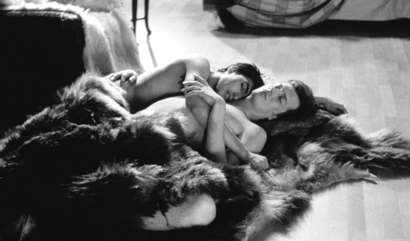Russian love triangle, where allusions trump surefootedness, saved by the players
Social progress, never mind economic development, has been, to say the least, spotty in Russia in the years since the fall of the Soviet Union and its communist ideology. The halting advance of gay rights and gay culture has been particularly awkward despite the fact that homosexuality was decriminalized in 1993.
So, when a movie comes out of Russia featuring a bizarre, bisexual love triangle, it’s worth a look, especially if you’re interested in things Russian and willing to indulge a welter of cultural references, some obscure, others heavy-handed, from that nation’s past.
“You I Love” takes place in today’s Moscow, and opens with a budding romance between Timofei Pechorin (Evgeny Koryakovsky) and Vera Kirillova (Lyubov Tolkalina). Timofei is an advertising executive whose company develops soda marketing campaigns full of slogans like, “Cola is Freedom.” and Vera is an anchorwoman for the nightly news. They meet at a coffee shop in the wake of Vera falling victim to a pickpocket. Timofei feels guilty for not stopping the thief, and pays for her lunch.
A schlocky “we’re falling in love” montage shot in Moscow signals the incipient affair, but the sexy buildup leads to a lukewarm sexual encounter that leaves Vera wondering. Timofei, whose surname recalls the 19th century “superfluous man” in Lermentov’s novel “A Hero of Our Time,” seems as cold in the post-coital moment as the upper class anti-heroes of old Russian literature. (The name Pechorin stems from a freezing river, the Pechora, a symbol not lost on most Russians.)
Timofei soon meets Uloomji (Damir Badmaev), a young Kalmyk man who works in the Moscow zoo. Their meeting is also screwball––Uloomji falls onto the hood of Timofei’s car when his attempt to do a balancing act on a roadway divide falters under gravity’s inevitability. When a hospital refuses treatment to Uloomji, Timofei takes the young man home. Uloomji is soon coming onto Timofei, who seems responsive. It is at this moment, of course, that Vera walks in on them. The scene is quite tame––both men are semi-dressed––but Timofei’s hand on the young man’s leg says it all for Vera.
It is when Vera chooses to continue her relationship with Timofei despite the fact that Uloomji stays in the picture that the film begins to come off the track. Having two directors on the film may have contributed to the narrative incoherence that ensues. Uloomji’s behavior is erratic to begin with, but stands out in even sharper relief with the arrival of his Uncle Vanya (Victor Shevidov), a social climber who fears that his nephew’s gay antics will sink his ambitions. Vanya brings along Uloomji’s parents, who are dressed in typical nomad peasant garb. Uloomji’ family eventually tricks him into going back to his childhood home near Mongolia.
The storytelling is sufficiently uneven to leave us wondering why Vera hangs on for scraps of Timofei’s attentions, but also why he has any interest in staying involved with a strange zookeeper and his angry relatives. But the general tone of socials confusion does oddly evoke the dislocations, large and small, of a one-time lumbering superpower struggling to find its footing in a strange new world. For all their new economy sophistication, Timofei and Vera both show clear signs of unraveling, their personalities coming apart, and the film makes clear the age-old theme that the heart wants what the heart wants, despite “appearances.”
Couching a gay love story into a bisexual triangle might seem like a cop-out to New York audiences, but to the average Russian viewer, this material is pretty risqué stuff. Vera and Timofei “have it all”––including their own apartments, which may not seem so off-key to New Yorkers––but the facades they put up as they advance socially in the Western-style media and marketing industries, slip away as they are forced to experience their real feelings. The movie’s finale, reminiscent of Bertrand Blier’s 1986 bisexual romp “Menage,” will leave many viewers thinking, “What the…?” but the convincing performances from the trio of lead actors make “You I Love” worthwhile in rare gay film from a nation with an otherwise rich cinematic history.


































